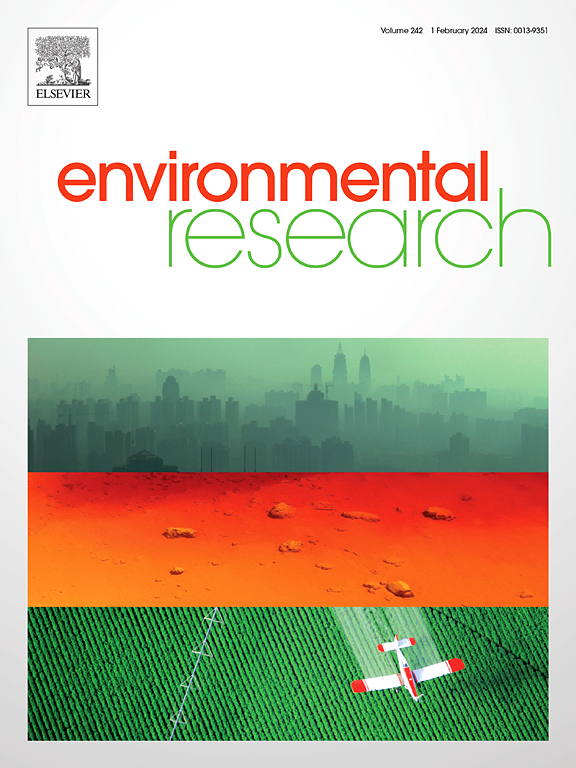Green synthesis of fluorescent carbon dots embedded in silanized cellulose nanofibers: A ensitive and ustainable platform for uranium detection and remediation
IF 7.7
2区 环境科学与生态学
Q1 ENVIRONMENTAL SCIENCES
引用次数: 0
Abstract
The rise of uranium ions in groundwater in Northern India has raised serious health concerns, including increased cancer cases. This study introduces a novel solution using a hydrothermal method to synthesize highly fluorescent and stable carbon dots (CDs) from Kalanchoe pinnata. These CDs were embedded in silanized cellulose nanofibers (SCNFs) to create an eco-friendly dual-functional adsorbent and fluorescent probe (SCNFs@CDs) for the remediation of UO22+ ions. Characterization confirmed the successful integration of CDs, preserving the nanofibrous structure necessary for stability and recovery. SCNFs@CDs demonstrated a strong affinity for UO22+ ions, even amid competing ions, evidenced by a linear decline in the fluorescence intensity at 360 nm when increasing the concentration, achieving a low limit of detection of 1.64 nM. Adsorption investigation demonstrated pseudo-second order with a maximal adsorption capacity of 196.07 mg g−1, signifying chemisorption. Remarkably, SCNFs@CDs maintained 87 % adsorption efficiency after five cycles of use. Our findings underscore the potential of SCNFs@CDs as an effective, and sustainable solution which can be used both for UO22+ ions sensing and adsorption from aqueous media, contributing to eco-friendly water purification technologies.
硅化纤维素纳米纤维中嵌入荧光碳点的绿色合成:一个灵敏和可持续的铀检测和修复平台
印度北部地下水中铀离子的增加引发了严重的健康问题,包括癌症病例的增加。介绍了一种利用水热法制备高荧光稳定碳点的新方法。这些CDs被嵌入到硅化纤维素纳米纤维(scnf)中,形成一种环保的双功能吸附剂和荧光探针(SCNFs@CDs),用于修复UO22+离子。表征证实了CDs的成功集成,保留了稳定性和恢复所必需的纳米纤维结构。SCNFs@CDs对UO22+离子具有很强的亲和力,即使是在竞争离子中,随着浓度的增加,荧光强度在360 nm处呈线性下降,达到1.64 nm的检测下限。吸附表现为伪二级吸附,最大吸附量为196.07 mg g−1,为化学吸附。值得注意的是,SCNFs@CDs在5次循环使用后仍保持87%的吸附效率。我们的研究结果强调了SCNFs@CDs作为一种有效的、可持续的解决方案的潜力,它既可以用于UO22+离子的传感,也可以用于水介质的吸附,为环保的水净化技术做出贡献。
本文章由计算机程序翻译,如有差异,请以英文原文为准。
求助全文
约1分钟内获得全文
求助全文
来源期刊

Environmental Research
环境科学-公共卫生、环境卫生与职业卫生
CiteScore
12.60
自引率
8.40%
发文量
2480
审稿时长
4.7 months
期刊介绍:
The Environmental Research journal presents a broad range of interdisciplinary research, focused on addressing worldwide environmental concerns and featuring innovative findings. Our publication strives to explore relevant anthropogenic issues across various environmental sectors, showcasing practical applications in real-life settings.
 求助内容:
求助内容: 应助结果提醒方式:
应助结果提醒方式:


